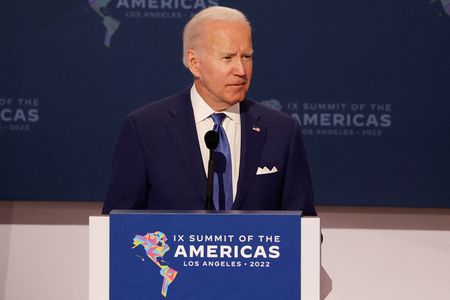 1
1 1
1

By Jarrett Renshaw
WASHINGTON (Reuters) -U.S. President Joe Biden on Friday said he was working with U.S. oil companies to boost output to record levels next year, while accusing the industry of capitalizing on a supply shortage to fatten profits.
U.S. consumer inflation accelerated in May as gasoline prices hit a record high and the cost of food soared, leading to the largest annual increase in four decades.
Biden, who came into office vowing to reduce U.S. dependence on fossil fuels, said on Friday he was hoping to speed up oil production, which is expected to hit record highs in the U.S. next year.
But he also offered a warning to the industry, which has ramped up profits as it increased prices, a sign that consumers are paying for more than just higher labor and shipping costs.
“It is also important that the oil and gas and refining industries in this country not use the challenge created by the war in Ukraine as a reason to make things worse for families with excessive profit-taking or price hikes,” he said in a statement.
Shell reported a record quarter in May and Chevron Corp and BP posting their best numbers in a decade.
Other majors, including Exxon Mobil and TotalEnergies, as well as U.S. independent shale operators, reported strong figures as the industry’s biggest players concentrate on share repurchases and dividend investments.
Numerous companies have said they will avoid excessive spending to boost output due to investors’ desires to hold the line on spending, rather than respond to the $100-plus prices that have been a fixture of oil markets for months.
The surging costs have become a political headache for the Biden administration, which has pulled on numerous levels to try to lower prices.
They include a record release of barrels from the country’s strategic reserves, waivers on rules related to the production of summer gasoline, and leaning on major OPEC countries to boost output.
Biden also urged Congress to pass legislation to cut costs of energy bills, prescription drugs and shipping.
(Reporting by David Gaffen in New York, Kanishka Singh in Washington; editing by John Stonestreet)